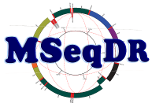Term ID: 25352
Name: Typically de novo
Synonym: Autosomal dominant germline de novo mutation
Definition: Description of conditions that are exclusively or predominantly observed to display de novo variants. In some cases, this may be due to the limited reproductive fitness of affected individuals.
Comments:
Reference: HP:0025352
Genes and Diseases: Child Nodes: Sister Nodes: ..Autosomal dominant inheritance with maternal imprinting (HP:0012275) ..Autosomal dominant inheritance with paternal imprinting (HP:0012274) ..Autosomal dominant somatic cell mutation (HP:0001444) ..obsolete Autosomal dominant contiguous gene syndrome (HP:0001452) ..Sex-limited expression (HP:0001470) Input HPO ID HPO term Distance Gene Gene id entrez HGNC ID DiseaseId DiseaseName Frequency Onset HGMD variants ClinVar variants HP:0025352 HP:0025352 Typically de novo 0 ATN1 CL E G H 1822 3033 OMIM:618494 Congenital hypotonia, epilepsy, developmental delay, and digital anomalies 16 HP:0025352 HP:0025352 Typically de novo 0 ATP11A CL E G H 23250 13552 OMIM:619851 LEUKODYSTROPHY, HYPOMYELINATING, 24; HLD24 HP:0025352 HP:0025352 Typically de novo 0 CHD8 CL E G H 57680 20153 OMIM:615032 AUTISM, SUSCEPTIBILITY TO, 18; AUTS18 72 HP:0025352 HP:0025352 Typically de novo 0 EIF2AK1 CL E G H 27102 24921 OMIM:618878 LEUKOENCEPHALOPATHY, MOTOR DELAY, SPASTICITY, AND DYSARTHRIA SYNDROME; LEMSPAD HP:0025352 HP:0025352 Typically de novo 0 GNB2 CL E G H 2783 4398 OMIM:619503 NEURODEVELOPMENTAL DISORDER WITH HYPOTONIA AND DYSMORPHIC FACIES; NEDHYDF HP:0025352 HP:0025352 Typically de novo 0 KMT2C CL E G H 58508 13726 OMIM:617768 Kleefstra syndrome 2 99 HP:0025352 HP:0025352 Typically de novo 0 MAPK1 CL E G H 5594 6871 OMIM:619087 NOONAN SYNDROME 13; NS13 2 HP:0025352 HP:0025352 Typically de novo 0 PIK3CA CL E G H 5290 8975 OMIM:619538 CEREBRAL CAVERNOUS MALFORMATIONS 4; CCM4 162 HP:0025352 HP:0025352 Typically de novo 0 PIK3R2 CL E G H 5296 8980 OMIM:603387 Megalencephaly-Polymicrogyria-Polydactyly-Hydrocephalus syndrome 12 HP:0025352 HP:0025352 Typically de novo 0 POLR2A CL E G H 5430 9187 OMIM:618603 NEURODEVELOPMENTAL DISORDER WITH HYPOTONIA AND VARIABLE INTELLECTUAL AND BEHAVIORAL ABNORMALITIES; NEDHIB HP:0025352 HP:0025352 Typically de novo 0 SEMA6B CL E G H 10501 10739 OMIM:618876 EPILEPSY, PROGRESSIVE MYOCLONIC, 11; EPM11 HP:0025352 HP:0025352 Typically de novo 0 ZBTB7A CL E G H 51341 18078 OMIM:619769 MACROCEPHALY, NEURODEVELOPMENTAL DELAY, LYMPHOID HYPERPLASIA, AND PERSISTENT FETAL HEMOGLOBIN; MNDLFH
Human Phenotype Ontology(HPO) is developed by the Human Phenotype Ontology Consortium. The version used here is December 15 2022 release.




